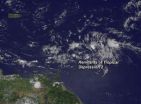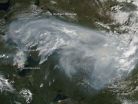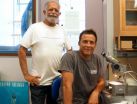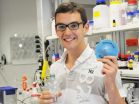(Press-News.org) Not getting enough sleep may increase the likelihood of forming false memories, according to research published in Psychological Science, a journal of the Association for Psychological Science.
In a study conducted by psychological scientist Steven J. Frenda of the University of California, Irvine and colleagues, sleep-deprived people who viewed photographs of a crime being committed and then read false information about the photos were more likely to report remembering the false details in the photos than were those who got a full night's sleep.
Research has demonstrated that failing to get your full eight hours interferes with cognitive functioning, but Frenda noticed a gap in the literature when it came to sleep and memory.
"Over the years I noticed that whenever I had a bad night's sleep, my perception and memory seemed to get fuzzy until I had a good recovery sleep," explains Frenda. "I was surprised to find that there were so few empirical studies connecting sleep deprivation with memory distortion in an eyewitness context. The studies that do exist look mostly at sleep deprived people's ability to accurately remember lists of words—not real people, places and events."
A preliminary study conducted by Frenda and colleagues suggested that getting 5 hours of sleep or less was associated with the formation of false memories. The researchers then designed an experiment to investigate whether pulling an all-nighter would increase the likelihood of forming false memories.
Upon arriving to the lab in the late evening, the 104 college-age participants were assigned to one of four groups. Two groups were presented with a series of photos depicting a crime being committed as soon as they arrived to the lab — one group was then allowed to go to sleep, while the other group had to stay awake all night in the lab. The remaining two groups did things in the reverse order — they either slept or stayed awake all night and then viewed the crime photos in the morning.
In the second part of the experiment, the participants read narratives containing statements that contradicted what the photographs actually showed. For instance, a text description might say that the thief put a stolen wallet in his pants pocket, whereas the photo shows him putting it in his jacket.
The researchers found that only those students who had been sleep deprived for all parts of the experiment — that is, they viewed the photos, read the narratives, and took the memory test after having stayed up all night — were more likely to report the false details from the text narrative as having been present in the crime photos.
The students who viewed the photos before staying up all night, however, were no more susceptible to false memories than the students who'd been allowed to sleep.
The researchers believe these findings have important legal applications:
"Recent studies are suggesting that people are getting fewer hours of sleep on average, and chronic sleep deprivation is on the rise," says Frenda. "Our findings have implications for the reliability of eyewitnesses who may have experienced long periods of restricted or deprived sleep."
Frenda concludes that more research is necessary before scientists can provide law enforcement with evidence-based guidelines on how to best ensure that eyewitnesses' memories are accurate:
"We are running new experiments now, in order to better understand the influence of sleep deprivation on processes related to false memory."
INFORMATION:
In addition to Frenda, co-authors on the study include Lawrence Patihis and Elizabeth Loftus of the University of California, Irvine, and Holly Lewis and Kimberly Fenn of Michigan State University.
For more information about this study, please contact: Steven Frenda at sfrenda@uci.edu.
The article abstract is available online: http://pss.sagepub.com/content/early/2014/07/15/0956797614534694.abstract
The APS journal Psychological Science is the highest ranked empirical journal in psychology. For a copy of the article "Sleep Deprivation and False Memories" and access to other Psychological Science research findings, please contact Anna Mikulak at 202-293-9300 or amikulak@psychologicalscience.org.
Sleep deprivation may increase susceptibility to false memories
2014-07-23
ELSE PRESS RELEASES FROM THIS DATE:
Satellite shows Atlantic Tropical Depression degenerate
2014-07-23
NOAA's GOES-East satellite captured imagery of the Atlantic Ocean's Tropical Depression 2 is it degenerated into a tropical wave on July 23.
At 1445 UTC (10:45 a.m. EDT), NOAA's GOES-East satellite captured an image of what was once Tropical Depression 2 (TD2), about 400 miles east of the Lesser Antilles. The GOES-East visible satellite imagery indicated that the depression weakened since July 22. TD2 appeared as just a weak swirl of clouds with no strong thunderstorms or deep convection. The GOES image was created by NASA/NOAA's GOES Project at NASA's Goddard Space Flight ...
Gene inhibitor, salmon fibrin restore function lost in spinal cord injury
2014-07-23
Irvine, Calif., July 23, 2014 — A therapy combining salmon fibrin injections into the spinal cord and injections of a gene inhibitor into the brain restored voluntary motor function impaired by spinal cord injury, scientists at UC Irvine's Reeve-Irvine Research Center have found.
In a study on rodents, Gail Lewandowski and Oswald Steward achieved this breakthrough by turning back the developmental clock in a molecular pathway critical to the formation of corticospinal tract nerve connections and providing a scaffold so that neuronal axons at the injury site could grow ...
Fires in the Northern Territories July 2014
2014-07-23
Environment Canada has issued a high health risk warning for Yellowknife and surrounding area because of heavy smoke in the region due to forest fires. In the image taken by the Aqua satellite, the smoke is drifting eastward along normal wind patterns. Fire is an obvious health hazard, but the smoke that comes from fires is not quite so obvious and its effects are insidious.
The smoke released by any type of fire (forest, brush, crop, structure, tires, waste or wood burning) is a mixture of particles and chemicals produced by incomplete burning of carbon-containing ...
Study links enzyme to autistic behaviors
2014-07-23
RIVERSIDE, Calif. — Fragile X syndrome (FXS) is a genetic disorder that causes obsessive-compulsive and repetitive behaviors, and other behaviors on the autistic spectrum, as well as cognitive deficits. It is the most common inherited cause of mental impairment and the most common cause of autism.
Now biomedical scientists at the University of California, Riverside have published a study that sheds light on the cause of autistic behaviors in FXS. Appearing online today (July 23) in the Journal of Neuroscience, and highlighted also on the cover in this week's print issue ...
This week from AGU: New Oso report, rockfall in Yosemite, and earthquake models
2014-07-23
From AGU's blogs: Oso disaster had its roots in earlier landslides
A research team tasked with being some of the first scientists and engineers to evaluate extreme events has issued its findings on disastrous Oso, Washington, landslide. The report studies the conditions and causes related to the March 22 mudslide that killed 43 people and destroyed the Steelhead Haven neighborhood in Oso, Washington. The team from the Geotechnical Extreme Events Reconnaissance (GEER) Association, funded by the National Science Foundation, determined that intense rainfall in the three ...
York University researchers use bird 'backpacks' to put wood thrushes migration on the map
2014-07-23
TORONTO, July 23, 2014 – Migratory songbirds are disappearing, and though conservationists are examining several possible reasons such as climate change, loss of habitat, acid rain and light pollution, a key piece of the puzzle has remained missing: where do these birds go once they leave their breeding sites, and what threats may they be encountering along the way?
To answer this question, a team of researchers out of York University have created the first ever migratory connectivity map produced for a songbird, using tracking from both breeding and winter sites. They ...
Diseases of another kind
2014-07-23
The drought that has the entire country in its grip is affecting more than the color of people's lawns. It may also be responsible for the proliferation of a heat-loving amoeba commonly found in warm freshwater bodies, such as lakes, rivers and hot springs, which the drought has made warmer than usual this year.
A 9-year-old Kansas girl recently died of an infection caused by this parasite after swimming in several area lakes. The amoeba enters the body through the nose of an individual and travels to the brain. Nose plugs can lower the odds of this rare but fatal pathogen ...
ETH student develops filter for clean water around the world
2014-07-23
Roughly 780 million people around the world have no access to clean drinking water. According to the World Health Organization (WHO), 3.4 million people die from water-related diseases every year. ETH student Jeremy Nussbaumer set himself the goal of making a contribution to solving this problem. Working with researchers from a group led by Wendelin Stark, head of the Functional Materials Laboratory, the 23-year-old spent a year researching a membrane filter and developing a prototype.
"What makes our DrinkPure filter unique is that you can screw it on to virtually any ...
Ketamine can be a wonder drug for ER patients and their physicians
2014-07-23
WASHINGTON -- For critically ill patients arriving at the emergency department, the drug ketamine can safely provide analgesia, sedation and amnesia for rapid, life-saving intubation, despite decades-old studies that suggested it raised intracranial pressure. The results of a systematic review of 10 recent studies of what many emergency physicians regard as a "wonder drug" are published online in Annals of Emergency Medicine "The Effect of Ketamine on Intracranial and Cerebral Perfusion Pressure and Health Outcomes: A Systematic Review."
"Apprehension for many years ...
Climate change and the soil
2014-07-23
Washington, DC -- The planet's soil releases about 60 billion tons of carbon into the atmosphere each year, which is far more than that released by burning fossil fuels. This happens through a process called soil respiration. This enormous release of carbon is balanced by carbon coming into the soil system from falling leaves and other plant matter, as well as by the underground activities of plant roots.
Short-term warming studies have documented that rising temperatures increase the rate of soil respiration. As a result, scientists have worried that global warming ...





